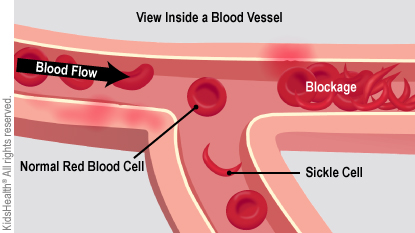Voxelotor for People With Sickle Cell Disease
What Is Voxelotor?
Voxelotor is a medicine that can help people who have sickle cell disease. (The brand name is Oxbryta®.) The medicine works by preventing red blood cells from becoming C-shaped and from breaking down too quickly.
People who take voxelotor (pronounced: vox-EH-lo-tor) have more healthy red blood cells and less anemia. Their red blood cells can deliver oxygen to their body more easily.
What Happens in Sickle Cell Disease?
Healthy red blood cells are soft, flexible, and round. Sickle cell disease makes red blood cells become sticky, hard, and C-shaped. The sickle cells get stuck and block the blood flowing inside small blood vessels. This can be painful and lead to other problems that need to be treated in a hospital.
Sickle cells also break down more quickly than healthy red blood cells. Not having enough red blood cells can lead to anemia. People with anemia feel tired and have less energy.

How Does Voxelotor Help People With Sickle Cell Disease?
Voxelotor helps red blood cells work better by:
- preventing them from becoming C-shaped
- slowing how quickly they break down
- making it easier for them to carry oxygen
Who Can Take Voxelotor?
People who are at least 4 years old can take voxelotor.
You can take voxelotor whether or not you already take the medicine hydroxyurea for sickle cell disease.
What's It Like to Take Voxelotor?
Here are the basics of taking voxelotor:
- Type of medicine: It comes either as a tablet to swallow or as a tablet to dissolve in liquid before drinking.
- Dose: You take it one time every day, with or without food.
- Timing: You take it at the same time every day. (Some people like to set a reminder on their phone.)
Does Voxelotor Cause Side Effects?
Most people who take voxelotor do well. Possible side effects include headache, diarrhea, stomach pain, and nausea. Rarely, someone might have tiredness, a rash, or a fever.
How Much Does Voxelotor Cost?
The amount you pay (if anything) for voxelotor will depend on your insurance. Ask your doctor for more information. Some programs may be able to help pay for out-of-pocket costs.
If your care team recommends voxelotor for you, talk to them about it. Ask questions and share any concerns. Talk it over with a parent or an adult you trust. Soon you’ll be ready to make a choice you can feel good about.


